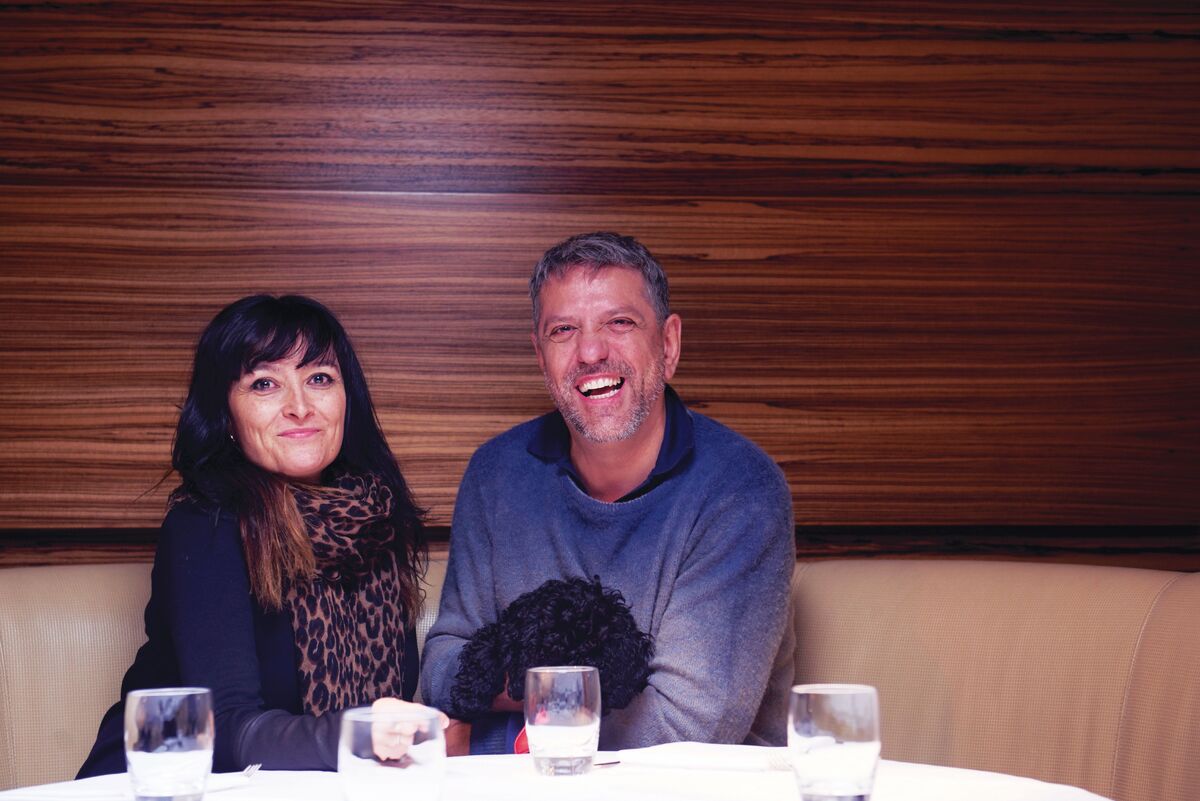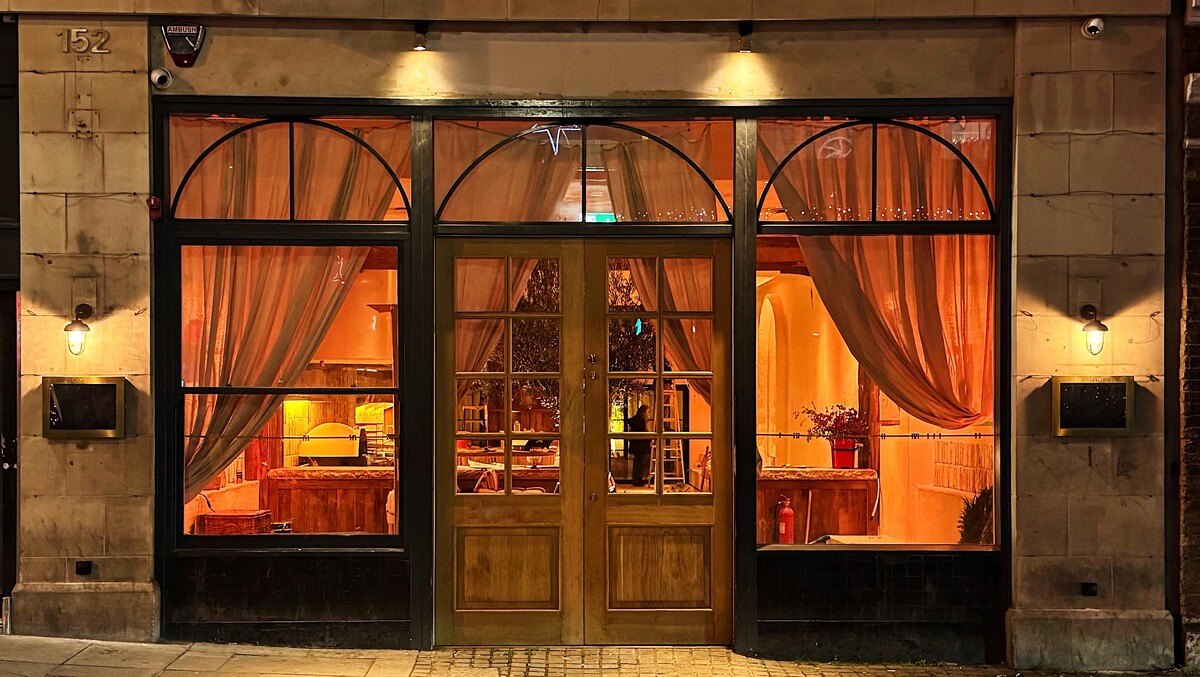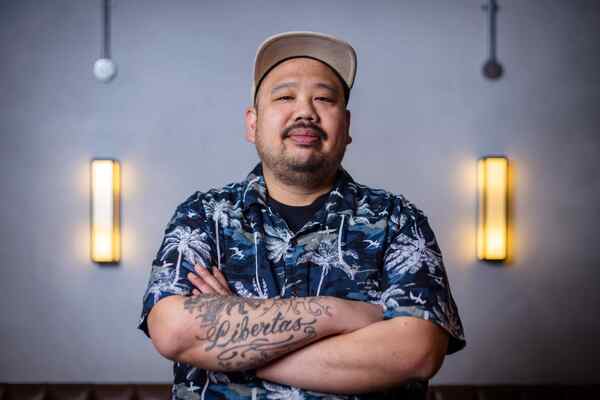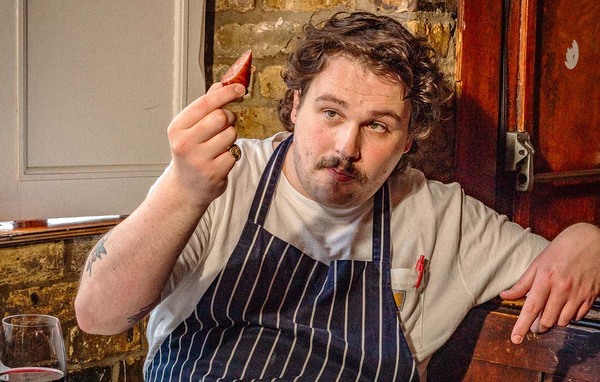Exclusive: Marco Pierre White on why he's back behind the stove for TV's Hell's Kitchen
After shunning the small screen throughout his career, one of the most famous - and notorious - chefs of the past 25 years is making his TV debut this summer in a new series of Hell's Kitchen. Has Marco Pierre White mellowed in eight years away from the stove? Mark Lewis went to find out
White is appearing onstage at Caterer's 2008 Chef Conference on 12 May - for a chance to win a ticket to the conference and ask him a question, go to the Editor's blog.
Brooding and foul-mouthed, volatile and controversial, Marco Pierre White was the enfant terrible of the British kitchen through the 1980s and 1990s. His verbal and physical brutalizing of other chefs and diners was the stuff of legend his cooking the stuff of genius.
White's story reads like a moral fable. His is the tale of the chef who spent 17 years working towards his dream of winning three Michelin stars, only to find that gaining them left him exhausted, disillusioned and wracked with self-doubt. His quest was founded on a belief that stars would bring acknowledgement, and acknowledgement, happiness. They did not.
Within a year of opening his legendary Harvey's restaurant in Wandsworth, south London, White had won first one star, and then a second. His third star, won at the Restaurant Marco Pierre White at the Hyde Park Hotel at the age of 33, made him the first British chef ever to reach such culinary heights, and the world's youngest ever chef to do so. Then, in 1999, he gave back his stars and walked away from the stove.
Today White is happier in his skin than ever he was during all his years behind the stove. From the corner booth in his St James restaurant, Luciano, Marlboro at his lips, he receives visitors and strikes deals, a latter-day Godfather administering his empire. This empire spans a portfolio of restaurants across London. Among them are the four branches of Frankie's, the chain of Italian restaurants he created with jockey Frankie Dettori. It's quite clear that he is enjoying himself. "I am the naughtiest boy in the industry," he smirks, "but without malice."
Two things have cast White back into the headlines in recent months. First, there was the announcement that he would be heading up the third season of Hell's Kitchen on our TVs this summer. Then came Gordon Ramsay's admission that he stole the reservations book from his own London restaurant, Aubergine, in 1998, and then blamed White for the theft. White issued legal proceedings a few weeks ago.
With the endlessly opinionated White about to don his blue-and-white-striped apron once again, this seems an appropriate time to ask how he views gastronomy today, what shape he thinks the industry is in, and which chefs he admires most. Caterer approached the corner booth in Luciano to find out.
Can you describe the world you entered as a young man?
I saw the tail end of the Escoffier world, and stepped into the modern world. Very few chefs had heard of Michelin and there were no celebrity chefs. Like the foreign legion, the industry accepted everybody. Young boys knocked on back doors to learn their trade, you didn't need qualifications. Lots of people were from working-class backgrounds. When you went for an interview you never asked how much you were going to earn, how many hours you were going to work, or in what section. If you ended up washing up, who cared? You were in a great house. When I went to the Box Tree, I got £26 a week, live-out. If I had to go in two hours early to do what I had to do well and properly, to be ready for service, I did it, I didn't question it.
I was privileged. I didn't work for Pierre Koffmann, Albert Roux, or the Box Tree boys - I cooked with them. They weren't figureheads, they were in the kitchen. Albert was nearly 50: you were cooking with a heavyweight. The guy had seen many things, met many people. Albert did the pass Nico cooked. That was the golden era of gastronomy in this country. They were cooks, they were behind their stoves, it was a different world.
In your autobiography you describe your insecurities, after your mother's death, because you felt your existence was "an extra cost". When you entered the kitchen, did you discover the security of a second family?
Yes. Take the Box Tree, the most magical restaurant I ever stepped into. They protected me, they loved me, they adored me, and they were very hurt when I left. Many people have made a contribution to what I represent and what I am. Did Michael Caine contribute to the man I am? Yes. Albert Roux? Yes. They're all a piece within me, what I am today is a piece of everything that's around me.
Did the kind of discipline you experienced rub off on you?
When I was a boy I started in hotels. Chefs used to say: "You little f***ing c***. What are you?" I would say: "I'm a little f***ing c***, chef." I thought that's what I had to say. But it was nothing personal, it was the way of life. It was the way kitchens had been run for years and you just said yes chef, no chef. No matter how many times you were knocked down you picked yourself up - and if you didn't pick yourself up the people around you picked you up.
You have likened taking a job at Harvey's to joining the SAS. How would you answer the criticism that your leadership methods were too strict, too brutal?
Whether my rules were conventional or not is an irrelevance. My methods might not have been conventional but they were real and I inspired a generation. Look at the people who went through my kitchen: Ramsay, Blumenthal, Neat, Blunos, Clifford - lots and lots of starred chefs. At the end of the day, I did my little bit for the industry. I was controversial, yes - but I fought for standards.
Are we losing the traditional craft skills?
The problem is chefs want to be chefs at a very young age today. Young boys go into the world of catering to be celebs now. When I was a boy, I'd watch the butcher bone out the meat. I'd develop knife disciplines by getting scraps of meat off the bone, to make mince for the staff shepherd's pie. I'd chop bones for stock. Game came on the feather, deer on the skin. I think it's very important for young chefs to see meat on the hoof. You can move on to portion control after a while. I'd have sacks of peas to pod. It taught you how to be quick and organised.
So learning on the job is the best way to develop skills?
College is the biggest waste of time. It doesn't prepare people for the industry. It gives a false sense of security. In the real world they struggle. I believe in day-release, for those who think it's important to get qualifications.
In 1995 you became the first British chef and the youngest chef ever to win three Michelin stars. What made you give them up?
I was fortunate. I had a top award in every guide: I had 10 out of 10 in the Good Food Guide, 19 out of 20 in the Gault-Millau guide, three Egon Ronay rosettes, five AA rosettes, three Michelin stars with five red knives and forks. The Caterer Chef Award was the only thing that ever eluded me! But I had the grand slam and I thought, where can I go from here? I was being judged by people who had less knowledge than me, so what was it truly worth? I gave Michelin inspectors too much respect, and I belittled myself. I had three options: I could be a prisoner of my world and continue to work six days a week I could live a lie and charge high prices and not be behind the stove or I could give my stars back, spend time with my children and re-invent myself. I never left the stove, I never lived that lie. I'm not that trusting that someone could do what I did. That's why I bowed out.
After stepping away from the stove, I played in the fields, deer stalking, fishing, for five years, to discover who I was. I was a contradiction, in the sense that I spent 17 years chasing something I never wanted. True success is self-discovery. I don't need stars to feel good about myself. The Michelin guide is Mickey Mouse now. I never buy it anymore.
Ten years after giving up your stars, how do you view gastronomy?
I hate the snobbery of it. I hate food being overworked. Most chefs paint pictures on plates to hide their lack of technical ability. They are doing it for themselves, not for their guests. How many people walk into a Michelin-starred restaurant and don't feel comfortable? They can't take their tie or jacket off, can't speak too loudly. When I had my three stars I never had a dress code. Who am I to dictate how people should dress? And how many think they've got to say the food is delicious because of where they're sitting? If they are honest, they'd prefer to have a corned beef sandwich with some Branston's or get a take-away curry.
Why should good eating be so formal? I don't want a f***ing tasting menu. You have one mouthful and then you are waiting for the next course! Starter, main course - if it's that good I'll come back tomorrow and choose some other ones. If you force things in life, they break. Allow people to eat food! Waiters start talking you through every dish like you are an imbecile.
So good food is all about simplicity?
Gastronomy begins with ingredients, full stop. Buy great produce. Teach yourself how to cook a great piece of meat, a great piece of fish. That is the foundation.
Really intelligent people put two or three things on a plate. If you cook a piece of fish or meat perfectly you don't need a lot of sauce, do you? How many times do you go to a restaurant, order what you order, and it doesn't look like anything you've ordered? I want sea bass to look like sea bass I want a partridge to look like a partridge.
As I got older, I became simpler with my food. I had little Harvey's, yes? When I moved to the Oak Room my style changed. I had to deliver 100 covers at three-star level. It forced me to simplify myself. Now, I like to eat one thing at a time, I don't like a mess of things on a plate.
How do you feel about current produce trends?
The modern-day chef has made the world too precious. It's like when you see people talking about organic. It's very wrong. Don't force it down everyone's throats. Not everyone can afford organic. I prefer to eat normal carrots cooked by someone who can cook than organic carrots by some f***er that can't cook. You talk about these baby carrots - well, they've got no flavour, you talk about baby fennels or courgettes, they've got no flavour. Give me a substantial-sized carrot.
I buy into simplicity. Knorr is the best f***ing ingredient in the world, let's not kid ourselves. Knorr chicken cubes? Genius product. Every kitchen should have a packet. The problem is most people don't know how to use it. It's like ketchup: it's a great sauce. Coleman's, Worcester sauce, they've all got their places. It's what you do with them. The Box Tree did a sauce with Worcester sauce that was the most delicious sauce in the world to serve with beef. And the Box Tree had two stars.
Have your recipes stood the test of time?
I looked at White Heat the other day, I looked at some of the dishes and if you served them in the right crockery they wouldn't be out of date today. Some of them are really out of date, though - like the assiette de chocolate that was of the moment 20 years ago. Actually my food became very simple in the end, it wasn't overworked, and whatever you served with it complemented it. I believed in refinement, not invention, in taking classical dishes and refining them for the modern-day palate.
With the growth of Frankie's, it seems your philosophy on food has moved on a lot from the three-star days.
I want to take good eating to a nation, at a price point, with glamorous surroundings. I'm not in the business of food and wine anymore, that's a thing of the past. I'm in the business of selling fun, selling a night out. Food and wine is a by-product of what we do. Life is very short, and we've just got to sit down and enjoy our lives. It's about casual dining. I'm an old-fashioned restaurateur, I love embracing people. I love the table by the door so you get them on the way in and the way out.
What are you up to these days?
I was very privileged I was in the right place at the right time. I had long hair, I wore a blue-and-white-striped apron, I took on the establishment. I was obsessed with winning three stars, and I was prepared to make the sacrifice. I did my little bit for the trade. Now I step in and out of the ring. For instance, I'm working with P&O on a restaurant on their new cruise ship, Ventura. I'm enjoying the experience of working with Mike Monahan, their fleet's corporate chef: he's of the same generation as me, shares the same mindset and possesses talents I don't have.
Why have you decided to do Hell's Kitchen? Do you fear that people might think you are following Ramsay's lead? And will you be confrontational?
Why I'm doing Hell's Kitchen is not about turning people into great cooks, it's about inspiring them to want to cook. I can't turn someone into a three-star chef, but I can give them some understanding, some appreciation. I've got to inspire a team I've got to inspire the punter at home. How I achieve that I don't care. Nothing is personal it's service, that's it. If people think I'm controversial, then fine. I have to feed 70 people a night to a standard, and feel flattered that they chose to come to eat that night, and I'm not there to impress people, to be people's friends. When I had my stars, I maintained my currency - I never appeared on TV. Now I don't have three stars, I'm in a position to do what I want to do. In a strange way, I'm looking forward to stepping back behind the stove. Gordon did it his way I'll do it my way. We all have different ways of expressing ourselves. I want my emphasis to be on the food and the kitchens rather than the swearing.
You've had a turbulent relationship with Ramsay over the years. How do you view the Ramsay phenomenon?
I've got to be careful what I say about Gordon, as I'm about to issue legal proceedings against him. I don't know how often he cooks in Royal Hospital Road, or how often he wears an apron now, with his busy schedule. In the end, if you stretch yourself, the food can no longer be personal and the only way to achieve a standard is to cook by numbers.
How do you define a great chef?
Great cooks recognise a few things. Number one, they recognise that Mother Nature is the true artist, and the chef is the technician. Number two, everything should be an extension of you as a person. Number three, chefs should be the same as great poets and artists. What you give people is an insight into the world that you came from. Koffmann gave you an insight into the world he came from, in Gascony. Albert gave me an insight into where he came from, cooking in those big private houses like the Rothschilds'. Michel Bourdin - those great French restaurants of the 1950s and 1960s. For me, my wife's mother is the best cook I know. She gives me an insight into that Spanish peasant world, and she cooks with love. She might do a butter bean broth with belly pork. Delicious! They way they touch food, the way they put food on a plate, you know they can cook.
What advice would you offer to young chefs starting out on their careers?
To realise your potential, first understand why you are doing what you are doing. What is your motivation? If you are prepared to invest the time and have the capability of a star, go and get it. But don't lie to yourself. Be a realist: only work for something you truly want, something that's possible within yourself. For many years I put all my energies on a plate. But I was socially inept. I had no self-knowledge. Once you discover yourself as a person then you will be able to discover food for what it is, and cook the type of food that you want to cook. I believe the industry allows people to express themselves, better themselves and create security like no other industry. But allow Mother Nature to be the artist, and put your energies into the cooking. Get into a good kitchen, stay for five years, keep your head down, take the bollockings and learn your trade.
Marco on other chefs
• On Heston Blumenthal: "He's the number one chef in the country today, without a doubt - he's in pole position."
• On Pierre Gagnaire: "Gagnaire is magic. You can teach a child how to talk, you can teach a dog to retrieve a stick, but magic comes from within."
• On Raymond Blanc: "Raymond is a genius. Raymond is a three-starred-chef. His intellect is extraordinary - in terms of flavour, texture, technical ability. He never cooked by numbers."
• On Eric Chavot: "The best chef in London without a doubt."
• On TV chefs: "You can't knock people who go on TV unless they start to question their own integrity. Jamie makes his living out of TV, not out of stars. Ainslie, ditto. How can you mock them? They aren't trying to be credible they make a living the best way they can."
Coming soon: Marco guest-edits Caterer
To mark his return to the stove in Hell's Kitchen, Marco Pierre White takes over the editorship of Caterer and Hotelkeeper for one week this summer. He'll be choosing the topics for all our feature articles, and there'll also be some exclusive MPW recipes. Look out in the coming months for more details.
Latest Marco Pierre White news on CatererSearch
CatererSearch100 profile >>
Marco Pierre White is new star on Hell's Kitchen >>
Marco Pierre White to sue Gordon Ramsay over book theft >>
Gordon Ramsay and Marco Pierre White deny Von Essen link >>
Marco Pierre White and Frankie Dettori to open their fifth Frankie's at Selfridges >>
Marco's Restaurants
Book a table at any of Marco Pierre White's restaurants >>
Blogs
Superchefblog reviews Marco's autobiography ‘The Devil in the Kitchen' >>
Organ Grinder on whether Marco Pierre White has the right ITV ingredients >>
















